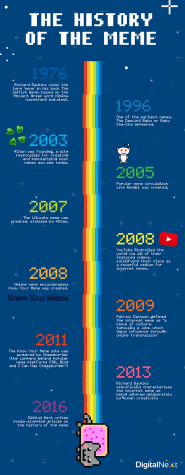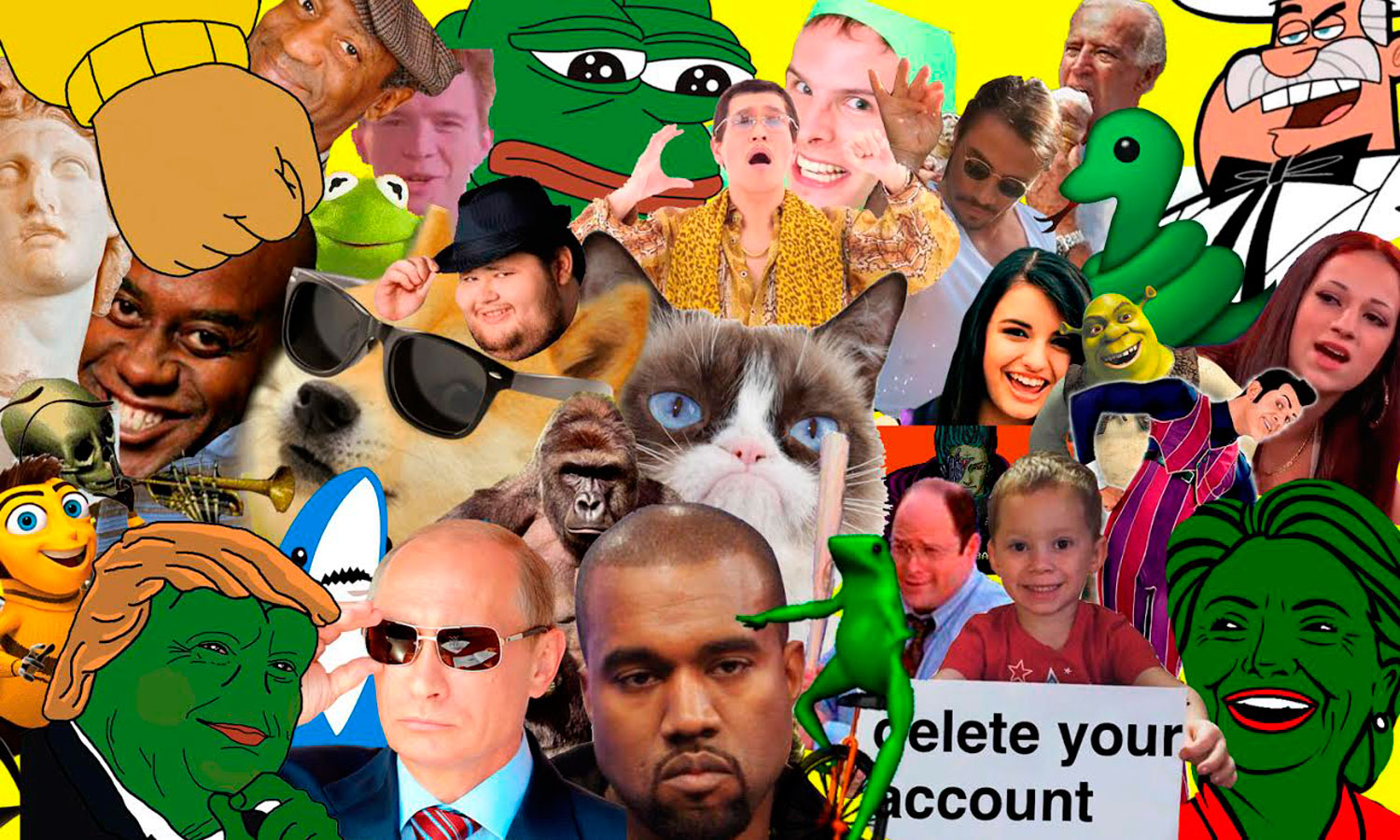 Laughter erupts from the lunch table as junior Ryan King passes his phone around to show his friends a screenshot of Kermit the Frog talking to a hooded version of himself. Exclamations of “same” and “me too” voice themselves at the relatable situation addressed in the caption of the picture.
Laughter erupts from the lunch table as junior Ryan King passes his phone around to show his friends a screenshot of Kermit the Frog talking to a hooded version of himself. Exclamations of “same” and “me too” voice themselves at the relatable situation addressed in the caption of the picture.
The Internet has become a melting pot of ideas since its almost pandemic-like spread in homes and workplaces over 20 years ago. With the world at our fingertips, the assimilation of knowledge and information that had once taken a whole few minutes digging around in an encyclopedia or a dictionary can now be accessed with the tap of a finger.
“Memes have improved my life by allowing me an easy way to laugh every day,” King said. “It’s easier than manufacturing dry humor with non-memers.”
We’ve painted the World Wide Web with different aspects of our culture — from Kylie Jenner’s relationship with Tyga, to remixing an old song from a beloved children’s show, to getting a cartoon frog listed as a hate symbol. These aspects reach far-off countries, hundreds of thousands of miles away, and unite us through shared interest.
We know them as “memes.”
Dating back as far as 1979, Internet memes have been shared, spread and distributed around the world. Some of the earliest examples of memes include Baby Cha-Cha, Don’t Copy That Floppy, The Hampster Dance and Star Wars Kid. Over the past 10 years, the term “meme” has come to mean a multitude of different things — what originally started as something as simple as a viral picture of a disgruntled cat has now evolved into a wacky art form.
“I think [memes] are a way to take current issues and use them as satire,” history teacher Coach Michael Keel said. “Satire is a form that’s been going on throughout history; [memes are] this generation’s 140 character satire.”
The bond created through the sharing of memes to express different events, thoughts and opinions often lead to an increased sense of unity. Communities of avid meme users and makers, such as Reddit and Know Your Meme, have popped up all over the Internet to aid in the distribution of these ideas — and to provide laughs and cat pictures to the public.
“I think meme culture has been able to get across a different side of information,” King said. “We’re also seeing the funny side of things and it makes tragic events [more] bearable.”
The use of memes as a coping mechanism for the otherwise surreal disasters that surface in the news and online reduces the heavy emotional burden placed on teenagers. What some view as a bizarre and gross exercise of dark humor really just translates into a healthy way to confront the horrors of the world.
“Memes are able to speak on a level that words can’t,” senior Shane Boettiger said. “I think memes are a great medium to get your message across — both good and bad.”
While at times memes may come across as hostile and offensive, poking fun at a historical figure or a tragedy in a less than appropriate way, for a majority of people, memes can lead to good things. Stefán Karl Stefánsson, actor of Robbie Rotten in the edutainment television show LazyTown, was diagnosed with pancreatic cancer in 2016. Following the success of the hit show, the Internet took to remixing and editing different musical numbers as jokes, which in turn brought attention to Stefánsson’s condition. Within months, over $100,000 had been collected on the actor’s GoFundMe.
“I think memes are a definitely positive,” King said. “They bring people joy and happiness [and] they make people laugh, everyone’s gotta laugh sometimes.”
Memes have even made their mark on Legacy with the introduction of the Meme Board, hung up in the cafeteria. Though it had started as a way to post school information — which club would be meeting at what time, what day the lunch lines would serve certain food — the students took it upon themselves to decorate it with the Pepe they liked the best or the latest Doge meme. They made it their own, to share with others.
“I guess memes, to me, are a part of life,” Boettiger said. “It’s kind of our culture.”





jumbo • May 11, 2017 at 5:23 am
Nice keep on posting.
guest • Apr 11, 2017 at 9:48 am
Show me something more iconic. I’ll wait.
Brandon Johnson • Mar 2, 2017 at 10:52 am
Memes are the thing in 2017 for the young generation. I found it interesting when the article said that students bonded over sharing humorous memes to each other. Memes are funny and harmless and it’s all about fun. Memes make sensitive/offensive events or things more desirable and entertaining.
micaih • Feb 17, 2017 at 8:16 am
iconic. newspaper KwEeNz